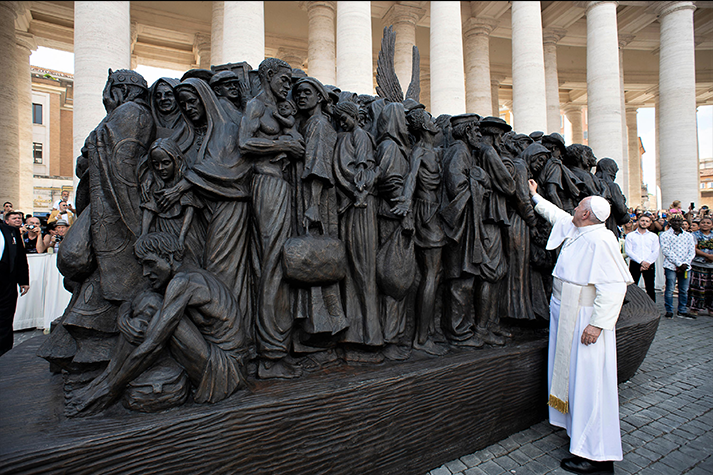
- Statement on Human Trafficking by the Bishops of Ireland
Human trafficking is a form of modern slavery and is an assault on our human dignity.
Ireland – north and south – is far from immune from human trafficking, as recent reports have shown. Women account for 67% of people trafficked into Ireland, and trafficking for sexual exploitation is the most common form of this crime, accounting for 55% of victims, followed by labour at 38% (IHREC Report, Sept 2023). The most recent Trafficking in Persons Report from the US State Department (published on 24 June 2024) notes Ireland’s ‘overall increasing efforts’ in addressing the seriousness of this question. However, as the report points out, the fact remains that Ireland is still a Tier 2 country in this regard, meaning that it “does not fully meet the minimum standards for the elimination of trafficking but is making significant efforts to do so”.
The Irish Catholic Bishops’ Conference welcomes the holding of a Senior Leadership Summit on collectively Combatting Human Trafficking, to be held in University College Cork on 26 – 27 June and that is jointly hosted by An Garda Síochána and the Santa Marta Group. The Santa Marta Group, under the patronage of Pope Francis, was established in 2014 to ‘act as a catalyst to bring systematic change to end human trafficking, together with law enforcement, civil society and the Church.’ Members of the Bishops’ Conference will be in attendance.
We welcome recent legislation to put the National Referral Mechanism on a statutory footing, along with other measures. But legislation is only as good as the resources in place to implement it and to root out this awful crime.
Human trafficking is wrong, it is illegal and it is sinful. The State has a duty to empower people working in this area and, in the area of prevention and the prosecution of traffickers. In this regard, there needs to be greater cooperation between the governments north and south on the island. This is now even more urgent due the increased numbers of immigrants forced to come here from the UK. Clear lines of responsibility are necessary for countering trafficking and for the protection of victims and survivors. We all have a responsibility to transform this situation; to end exploitation in our midst.
Trafficking often goes unseen. It is often said that human trafficking is hidden in plain sight. Therefore, we have a responsibility as a society to heighten our awareness of it. Many groups, including Catholic-based groups such as APT (Act to Prevent Trafficking), and Stella Maris Apostleship of the Sea, are already working to counter human trafficking in Ireland. Their work involves hands-on assistance of victims and includes awareness raising in the education, healthcare and hospitality sectors, and with security services and airport staff.
But parishes, too, can play their part. By becoming more informed, by learning the tell-tale signs of trafficking, by increasing awareness of the available support services for victims in place and finding out what to do if you suspect someone in your local area has been trafficked here. As Pope Francis says: ‘We know that the fight against trafficking can be won, but it is necessary to get to the root of the problem and eliminate its causes.’
In wishing the Santa Marta gathering every blessing for its success, we commit ourselves and our local Churches to support those who work to combat this modern slavery. We urge leaders in the spheres of business, politics and social affairs, and all of us as consumers, to put human dignity ahead of profit and gain. If we close our eyes and ears, if we do nothing, we are guilty of complicity.
We also ask people to pray for those suffering as a result of trafficking and to bring that prayer to action by becoming the eyes and ears – and the voice – that victims need in our midst. It is never too late to take action.
ENDS
- The Santa Marta Group was established in 2014. Its President is Cardinal Vincent Nichols, Archbishop of Westminster, UK. Cardinal Nichols will be attending the Summit in Cork.
- Further information on the work of Santa Marta Group can be found at Santa Marta Group | We are a catalyst to combatting human trafficking.
- The US State Department Trafficking in Persons Report is available on this link 2024 Trafficking in Persons Report – United States Department of State

